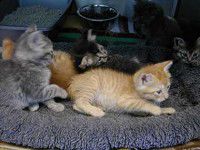South Pacific County Humane Society Pet Report: Want to clone your pet?
Published 5:00 pm Tuesday, October 4, 2005

- South Pacific County Humane Society Pet Report: Want to clone your pet?
Love your cat? Want to have another just like her? Well, today you can do just that – for the right price.
In 2001, researchers at Texas A&M University for the first time successfully cloned a cat. The kitten turned out to be as healthy and energetic as any naturally conceived kitten.
Despite the fact that they called her CC (for Carbon Copy), however, she bore no resemblance to her surrogate mother, a tabby. She also was not identical in appearance to the donor from which her DNA had been extracted.
But she was the world’s first successfully cloned kitten.
Others had been attempted. They either developed health problems or were stillborn. But today, four years later, CC is living in an adoptive home, happy and seemingly quite healthy.
With the birth of CC, science was on a roll.
In 2004, for the first time, an American company successfully cloned two cats – Tabouli and Baba Ganoush – using a new method, chromatin transfer. (The names were borrowed from popular Middle Eastern foods, a salad and a dip.) This time, both were identical in appearance to their DNA mother.
These births were the first instance of consumer-caliber cloning technology. As a result, the California firm now is offering a pet cloning service to the public.
Genetic Savings and Clone (GSC), based in Sausalito, just north of San Francisco, is the world’s first firm to go commercial and offer the world’s pet-lovers the chance to clone their cats and dogs.
The firm’s chief executive officer, Lou Hawthorne, says the chromatin transfer process, for which they hold an exclusive license for the purpose of cloning pets, is safer and more efficient than traditional methods.
Where we stand todayThis summer, again for the first time, three other previously cloned cats (two females and a male) – this time, African wildcats – were themselves bred naturally by GSC researchers to produce healthy babies. It was, in effect, “dropping the other shoe” in this field of research achieving a breakthrough which, rather than dealing simply with house pets, could pave the way to saving the world’s many endangered animal species.
Scientists regard this as exciting news. Opponents regard it as something else.
The fact that clones of wild animals can themselves be bred naturally may make a critically important contribution to the future of the countless species that are threatened at present with extinction.
The two cloned mothers gave birth to a total of eight African wildcats in July and August of this year. The wildcat kittens are mirror images of their mothers.
The nature of these births advances the likelihood of high-tech reproduction for endangered species by confirming, not only that wild animals themselves can be cloned, but that those clones later can breed naturally in their own right.
The scientists reportedly also are working to clone the endangered bongo antelope, the clouded leopard, and other animals.
The ethical questionsObvious questions now arise concerning the ethical implications of the new procedure. As with most other advances in scientific technology, there are those who are not happy with news of the cloning breakthroughs.
Animal cloning foes charge scientists with trying to play God.
Spokespersons for some existing animal groups understandably bewail any scientific advance that allows cloned cats to enter a world that already has cats sitting homeless in thousands of animal shelters across the country.
Others, seeing the far-flung possibilities of this unquestionably dramatic achievement, applaud it as a serious and needed breakthrough for our wild animal populations.
Regardless of where one stands, the art of cloning marches inexorably forward, with new and exciting technology arising in the field nearly every day.
Aside from the religious, philosophical and ethical questions involved, many technical questions remain unanswered. Will a cloned pet have the same personality as its DNA donor? Will its emotions and intelligence be identical? Will there be unforeseen health problems down the road? Will the babies inherit their donors’ weaknesses as well as their strengths? Or will science find a way to circumvent, or remove, any faulty genes?
Only time can answer.
The bottom lineToday, though, the bottom line is this: You now can purchase a kitten that will look identical to your beloved old pet – and hopefully have an identical disposition – with all of its other features intact. Then, when your faithful old friend goes the way of all flesh, you can raise the newest model all over again from childhood.
The cost is only $32,000.
And you complain that our adoption fees are high!
We are a community-supported Shelter and depend on your contributions to keep our doors open. Thank you so much for caring!
The South Pacific County Humane Society Animal Shelter is at 330 2nd Street NE, next to the County buildings in downtown Long Beach, phone 642-1180. Our mailing address is P.O. Box 101, Long Beach, WA 98631. Web site: (www.beachpets.com). E-mail: (humane@reachone.com). We’re open from 11 a.m. to 4 p.m. Tuesday through Saturday.

